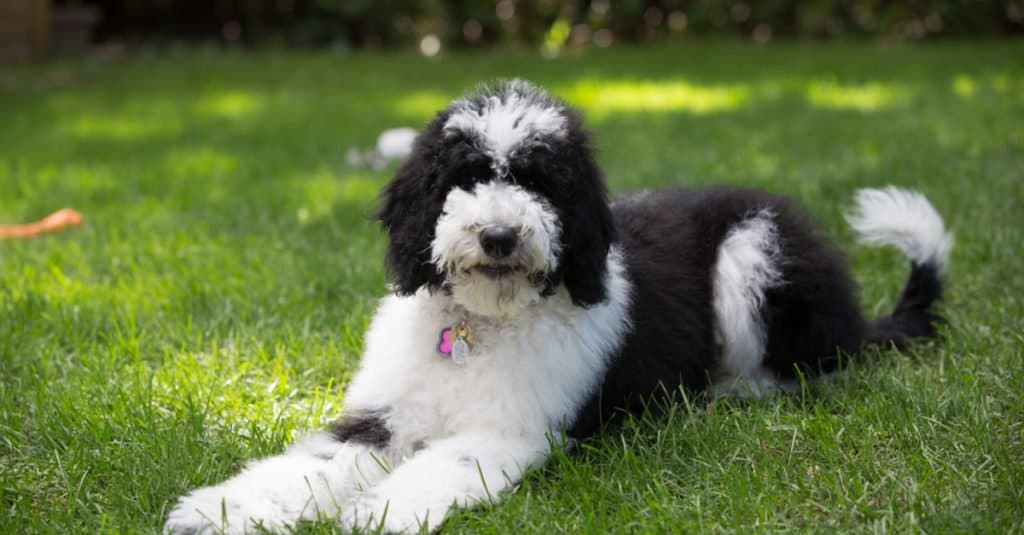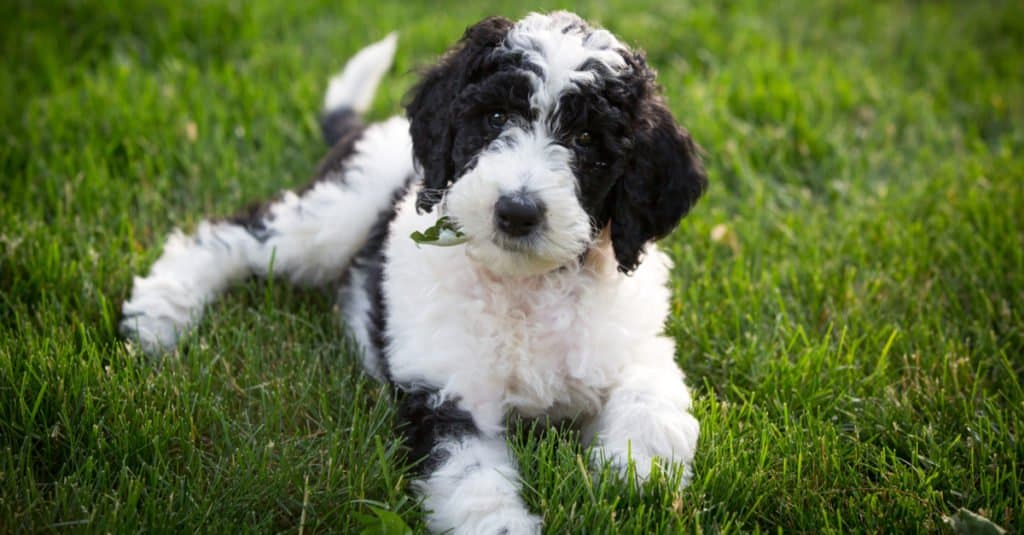Cuddly and fluffy, the sheepadoodle is one of the best dogs for families. They are a mix between an Old English sheepdog and a poodle. And they are excellent with children and other pets. These large, friendly dogs are energetic, playful, intelligent, and infinitely happy. They sound like the perfect dog, right? But are sheepadoodles hypoallergenic? Or will they have you sneezing and grabbing the tissues? Find out how much they shed and the downsides of owning these hybrids.
Is the Sheepadoodle Hypoallergenic?

Sheepadoodles were bred to be allergy-friendly pets. While no dog is 100% hypoallergenic, the sheepadoodle is an excellent option for allergies.
©Lisa Mounteer/Shutterstock.com
Sheepadoodles can be hypoallergenic, but it depends on the generation. No dog breed is 100% hypoallergenic, but some can be easier on allergy sufferers than others. The sheepadoodle is a mix between an Old English sheepdog (definitely not hypoallergenic) and a poodle (allergy friendly).
Shedding and dandruff are the primary culprits of dog allergens. And sheepdogs have a double layer of fur, meaning they shed more than usual. But the poodle doesn’t shed as much. Additionally, because their coats are more high maintenance, owners tend to bring them to the groomer more frequently. Frequent trimming and washing effectively keep allergens at bay.
So, what do you get when you cross a hypoallergenic dog with a non-hypoallergenic dog? Answer: a somewhat hypoallergenic dog. And depending on the generation, they may not be allergy-friendly at all.
Are Sheepadoodles Good for Allergies?
Generally, sheepadoodles are great pets for those with non-extreme dog allergies. Most won’t notice symptoms around these dogs. However, some still experience mild allergies, especially if the pups are not first-generation.
Some sheepadoodles have curly, wavy hair like poodles, which is optimal for allergy sufferers. But others can look more like the sheepdog and feature long, shaggy coats. Hybrids that more closely resemble their sheepdog side are not good pets for those with dog allergies.
Do Sheepadoodles Shed a Lot?
While breeders produce them to reduce shedding and allergens, they are not 100% shed-free. The correct term for sheepadoodles is “low-shed,” meaning they don’t shed a lot, but you will still see some fur. Most owners agree that if you brush them regularly, their coats typically stay tight and curly with minimal shedding. Some also report seeing more fur shed during the spring and fall when seasons begin to change. This is a direct response to increasing and decreasing temperatures.
What is Better: an F1 or F1B Sheepadoodle?

The F1 sheepadoodle is preferred for those with mild allergies. And the F1B or F1BB is best for those with severe allergies.
©Lisa Mounteer/Shutterstock.com
An F1 sheepadoodle is a first generation dog. The first generations come from a poodle and an Old English sheepdog, so they are half and half. F1B stands for first-generation backcross. These hybrids are bred using a poodle and an F1 sheepadoodle. They are 75% poodle and 25% sheepdog. You can go even further with an F1BB, which is an F1B sheepadoodle bred with a poodle. These hybrids are 87% poodle and 13% sheepdog.
The F1 sheepadoodle is best for those with mild allergies. And the F1B or F1BB is best for those with severe allergies. However, keep in mind that the further you get away from the F1, the more you lose this breed’s hybrid personality. For instance, the F1BB will resemble the poodle more closely in appearance and behavior than the F1. But this may be a sacrifice you’re willing to make depending on the severity of your allergies.
Is There a Downside to Sheepadoodles?

Sheepadoodles have a great personality. This breed is very affectionate and intelligent. However, they easily get separation anxiety.
©Sydney Jones/Shutterstock.com
Sheepadoodles have a lot of energy and are very social. These are desirable qualities, especially for families. But these breeds can be demanding. They do not like being alone, which can be an issue when family members have work and school every day. Not only do they get lonely, but they can also get bored and become destructive. And they are not an ideal breed for apartment living.
Sheepadoodle Pros and Cons
Pros:
- Playful and sweet
- Minimal shedding and drooling
- They do not bark a lot
- Easy to train (including potty training)
- Loves children and other pets
- Tolerant to cold weather
Cons:
- Separation anxiety
- Destructive behavior when left alone
- High maintenance (daily grooming)
- Nipping and herding behavior
The photo featured at the top of this post is © Jason Grant/Shutterstock.com
Ready to discover the top 10 cutest dog breeds in the entire world?
How about the fastest dogs, the largest dogs and those that are -- quite frankly -- just the kindest dogs on the planet? Each day, AZ Animals sends out lists just like this to our thousands of email subscribers. And the best part? It's FREE. Join today by entering your email below.
Thank you for reading! Have some feedback for us? Contact the AZ Animals editorial team.






